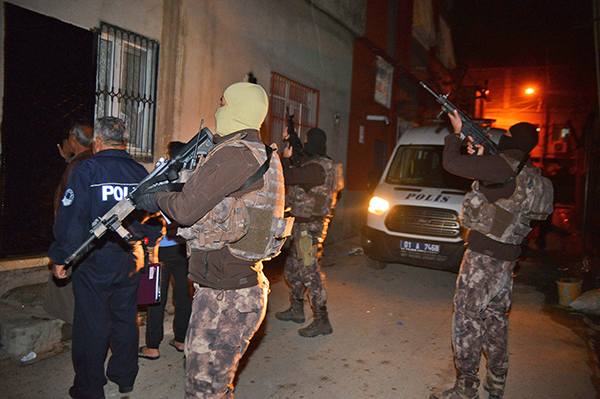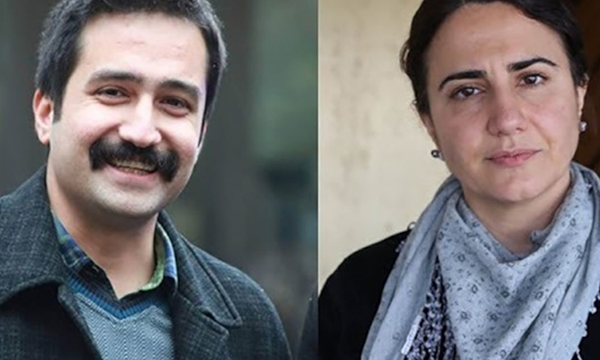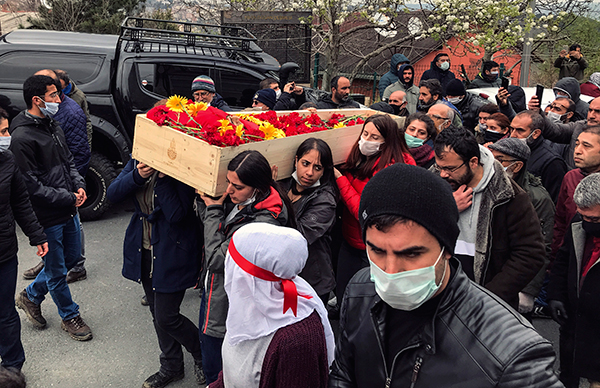The Rise and Consolidation of Erdoğan’s Fascist Regime in Turkey
| revcom.us
Editors’ Note: Last week, we published an article about developments with the fascist regime in India headed by Narendra Modi. This week, we are focused on the fascist regime in Turkey headed by Recep Erdoğan. These experiences illustrate how fascism takes a leap either through an election “mandate” or freedom seized by other means such as suppressing coups—and the serious implications of this for the masses of people.
Although what we face with the Trump/Pence regime is not identical, the examples of India and Turkey help illustrate the reality that if Trump is able to come through the next months of the election and stay in power—that will not simply be a matter of things getting somewhat worse. It will be a leap—a definite leap toward such consolidation. Thus, as Bob Avakian states in his recent statement, “Right now, for everyone who is concerned with ending injustice and oppression, and with the question of whether humanity will have a future worth living—or will have a future at all—removing the Trump/Pence fascist regime from power is an immediate, urgent question and truly historic imperative.”(Read the whole statement, ON THE IMMEDIATE CRITICAL SITUATION, THE URGENT NEED TO DRIVE OUT THE FASCIST TRUMP/PENCE REGIME, VOTING IN THIS ELECTION, AND THE FUNDAMENTAL NEED FOR REVOLUTION.)
A fascist is in power in Turkey—Recep Tayyip Erdoğan, who has been president since 2014. Erdoğan and his Justice and Development Party (AKP) did not start off as clearly fascist. The secular, highly militaristic and repressive government before Erdoğan was widely hated, and the country faced an economic crisis. Erdoğan and his AKP won popularity—seen as representing “moderate” Islam and a program of “modernizing” Turkey, with economic policies hospitable to the U.S. and other Western imperialist countries. Many hoped Erdoğan would solve Turkey’s economic problems and bring about a more “open” society.
But over a relatively short time, less than six years, Erdoğan has increasingly implemented and consolidated a whole fascist program. And in particular, in just four years, since a failed coup attempt in 2016, Erdoğan’s hold on power and his fascist program has greatly intensified.
As revcom.us has pointed out, “Fascism is the exercise of blatant dictatorship by the bourgeois (capitalist-imperialist) class, ruling through reliance on open terror and violence, trampling on what are supposed to be civil and legal rights…” But “while it will likely move quickly to enforce certain repressive measures in consolidating its rule, a fascist regime is also likely to implement its program overall through a series of stages…”
Indeed, in a series of stages, there have been nodal points where Erdoğan has used the situation to implement new and increasingly repressive, fascist, measures.
Failed Coup
In July 2016, after a failed coup attempt by elements in the military, Erdoğan instituted more fascist measures. More than 150,000 state employees were dismissed, 50,000 people were arrested. Erdoğan purged former allies who he accused of involvement in the attempted coup, and a whole campaign of repression was carried out.1
Declaring a state of emergency gave Erdoğan power to issue emergency decrees. More than 8,000 members of the Kurdish-led Peoples Democratic Party (HDP) were jailed, more than 6,000 university academics were dismissed and protests against the government were outlawed. Tens of thousands were arrested, including judges, teachers, academics, university deans and presidents, writers, students, workers and journalists.2 Erdoğan made further alliances with fascist ultra-nationalist forces. The state of emergency originally declared for three months was extended seven times before being ended in 2018.
Referendum and Re-election
In April 2017, Erdoğan succeeded in passing a nationwide referendum giving him vast new powers to control the judiciary, make law by decree and undermine the prime minister and the parliamentary system. The new rules said Erdoğan could run for two more five-year terms.
The referendum supposedly passed in a popular vote, but this election took place in a whole atmosphere of violence, intimidation and fear and continuing detention and arrest of tens of thousands.
The 2017 referendum changed the government from a parliamentary system to a presidential system of government. This was further consolidated when Erdoğan won a second term in June 2018. Originally set for November 2019, Erdoğan moved the vote six months earlier, preventing opposition forces from building their campaigns and allowing Erdoğan to quickly move forward to consolidate his fascist hold on power.
The day of the vote, critics of the government were rounded up and imprisoned. Between the attempted coup and this election, more than 100,000 were imprisoned, and Turkey became the country with the greatest number of jailed journalists in the world.
The consolidation of Erdoğan’s fascist rule has also gone hand-in-hand with increased repression and terror against the Kurdish people, the largest ethnic minority in Turkey. The Kurds have suffered decades of oppression. They have been a source of cheap hyper-exploited labor in dangerous “unskilled jobs.” Racist ideas about the Kurdish people are promoted in society and their culture has been denigrated. The Kurdish people have a long history of fighting against their oppression, and Erdoğan has stepped up attacks on the Kurds and repression against their continuing struggle. Protests against the mistreatment of Kurdish people is simply not permitted. Authorities censor Kurdish publications and social media, Kurdish writers are arrested and jailed and the government has sent in forces to attack and destroy uprisings in Kurdish towns using tear gas, tanks and artillery, killing many and forcing hundreds from their homes.
According to its 1928 Constitution, Turkey is supposed to be a secular country. But another aspect of Erdoğan’s fascist rule is his Islamicization of society. An article in the Huffington Post, just six months after the failed coup, reported, “Recently, a slew of government initiatives has pushed Islam deeper into Turkey’s secular education system. Examples include a plan to build mosques in 80 different state universities and convert one Istanbul University into an Islamic studies center. In December 2015, ‘a government-backed education council recommended extending compulsory religious classes to all primary school pupils, as well as adding an extra hour of obligatory religious classes for all high school students.’”3
In 1934, Mustafa Kemal Atatürk, the secular founder of the Turkish Republic, turned Hagia Sophia—a famous ancient cathedral that was later converted to a mosque—into a museum. But in July this year, after a Turkish court ruled to annul Atatürk’s decision, Erdoğan immediately signed a presidential order to turn the site back into a mosque. Erdoğan then made a big show of leading worshippers in the first prayers in Hagia Sophia.
Fascist Attacks on Dissent and Protest
Many thousands of teachers, professors, activists, lawyers, writers, workers, students and more have lost their jobs, been arrested and jailed, and tortured, many for just a tweet or an article in a newspaper.
In 2019, award-winning author Asli Erdoğan (no relation to President Erdoğan), speaking from self-imposed exile in Germany, said that after the 2016 failed coup, Turkey descended toward fascism. She had been associated with a pro-Kurdish newspaper and after the failed coup was arrested on charges of “being a member of a terrorist organization.” There has been controversy over whether to call the Erdoğan regime fascist. But Asli Erdoğan said, “Maybe it is really time to use the word ‘fascism.’”4
Right now, two people’s lawyers, Ebru Timtik and Aytaç Ünsal, are on a “hunger strike to the death”—as of August 11, Timtik for over 220 days and Ünsal for over 190 days. They are demanding a fair trial and the right of lawyers to defend people without being charged with being “terrorists.” They have been force-fed—internationally recognized as a form of torture that can result in permanent disability or death. Three other political prisoners on hunger strikes have already died this year. Two of them were members of a leftist band Grup Yorum. The government had banned their concerts and prevented them from performing. Six members of the band were arrested on August 5 as they were rehearsing for a concert.5
Erdoğan’s fascist attacks on dissent have even reached across Europe and the Atlantic Ocean to the United States. In 2019, the Erdoğan government labeled NBA Boston Celtics player Enes Kanter a “terrorist.” Kanter had called Erdoğan the “Hitler of our century” and been very outspoken against the sweeping political repression and arrests in Turkey. He received death threats, and Turkey issued an Interpol Red Notice for Kanter—a kind of international arrest warrant—labeling him a “terrorist.” In response, Kanter tweeted: “The only thing I terrorize is the rim,” along with a video of himself dunking.6
The Pandemic and Further Repression
Erdoğan is now using the COVID-19 crisis to further repress political prisoners. While releasing thousands of prisoners convicted of crimes like theft, rape or murder to alleviate crowded conditions, tens of thousands of political prisoners remain behind bars, subjected to the high danger of getting and dying from COVID-19.
Since 2002, when Erdoğan first emerged as a major political power, the number of people behind bars has gone from 60,000 to nearly 300,000. A major reason for this is the creation of new crimes, like “insulting the president.” Those convicted of this are not eligible for the COVID amnesty because most of them are charged with “membership in a terrorist organization.”7
The regime has also created new provisions that allow the government to target and arrest people during the COVID crisis for creating “panic and fear,” or provoking the public to “hatred and hostility.” More than 500 have been detained under these provisions, most commonly for criticizing the way Erdoğan is handling the pandemic.8
*****
In a relatively short time the fascist regime of Recep Tayyip Erdoğan has brought down horrific terror on hundreds of thousands of people. Step by step Erdoğan has put more, and even more blatantly fascist, measures in place and strengthened his hold on power. The ability for the Turkish people to speak out and protest is on the brink of being wiped out. The prisons in Turkey are filling up with people, from all walks of life, who dare to speak out against the regime. The founding tenet of secularism is increasingly being trampled on. This is what it means when a fascist is elected, re-elected and allowed to stay in power.
1. PBS Newshour, August 30, 2017. [back]
2. “The Roots of Turkish Fascism,” crimethnic.com, November 12, 2019. [back]
3. “Erdogan’s Lust For Power Is Destroying Turkey’s Democracy, Huffington Post, January 27, 2018. [back]
4. “Exiled Novelist: Turkey Tilts Toward Fascist Regime,” IPA News, March 31, 2019. [back]
5. “Turkey: Hunger striking lawyers defy Erdoğan’s repression,” Struggle La Lucha, by Greg Butterfield, August 11, 2020. [back]
6. “Boston Celtic Enes Kanter Calls Foul on Repression in Turkey,” Wall Street Journal, by Elizabeth Winkler, November 8, 2019. [back]
7. “Erdogan is using the coronavirus crisis to continue repressing political prisoners,” by Can Dundar, Washington Post, April 9, 2020. [back]
8. “Turkey: how Recep Tayyip Erdoğan is using coronavirus to clamp down further on dissent,” The Conversation, July 23, 2020. [back]

In less than six years, Erdoğan has implemented and consolidated a whole fascist program, greatly intensifying his hold on power and his fascist program since a failed coup attempt in 2016. Here, Turkish police surround house to arrest alleged supporters of Islamic State, November 20, 2017. (Photo: AP)

Thousands of teachers, professors, activists, lawyers, writers, workers, students and more have lost their jobs, been arrested and jailed, and tortured – many for just a tweet or an article in a newspaper. Here, heads of Turkish lawyers' associations protesting fascistic laws are confronted by riot police and prevented from marching to the capital, Ankara, June 22, 2020. (Photo: AP)

Two people’s lawyers, Ebru Timtik and Aytaç Ünsal are on a “hunger strike to the death,” demanding a fair trial and the right of lawyers to defend people without themselves being charged as “terrorists.”

April 3, mourners in Istanbul honor the prisoner hunger striker, Helin Bölek, member of a popular folk music group banned by Erdoğan, who died during the strike. (Photo: AP)
Get a free email subscription to revcom.us:

